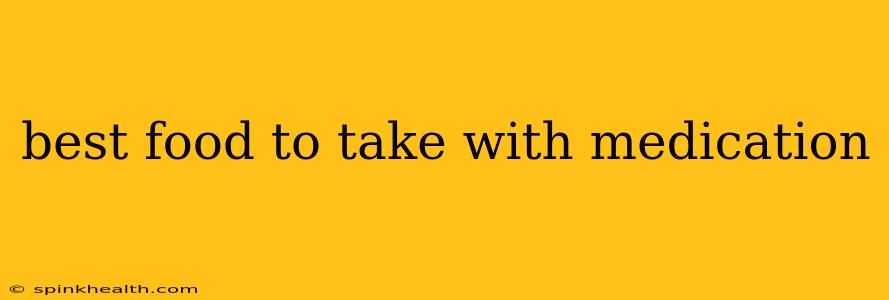The Best Foods to Take With Medication: A Delicious Guide to Better Health
Let's face it: taking medication isn't always fun. But what if I told you that choosing the right foods alongside your pills could actually enhance their effectiveness, minimize side effects, and even improve your overall well-being? It’s true! Just as a chef carefully selects ingredients to complement a dish, we can strategically pair our medications with foods to optimize their impact.
This isn't about strict dietary restrictions; it's about making smart, informed choices that support your health journey. Think of it as a delicious recipe for better medication management.
What are the best foods to eat with medication?
This isn't a one-size-fits-all answer. The ideal food pairings depend heavily on the specific medication you're taking. Some medications require a fatty meal for better absorption, while others might be better taken with a simple snack. Always consult your doctor or pharmacist for personalized advice. However, some general guidelines can help.
Foods that often enhance medication absorption and reduce side effects include:
- Foods rich in fiber: Fiber helps regulate digestion and can prevent some medication-related stomach upset. Think whole grains, fruits, and vegetables. However, some medications might interact negatively with certain fibers, so consult your doctor if you have concerns.
- Plain yogurt or kefir: These probiotics can aid digestion and potentially lessen some gastrointestinal side effects.
- Bananas: Easy to digest, bananas can be a gentle way to avoid an empty stomach when taking medication.
- Lean protein: Protein helps stabilize blood sugar levels and provides sustained energy, which can be particularly beneficial if your medication causes fatigue or blood sugar fluctuations.
What foods should I avoid with medication?
Certain foods can interact negatively with certain medications. These interactions can range from mild discomfort to serious health consequences. It's crucial to be aware of these potential interactions and to discuss them with your doctor or pharmacist. Some common examples include:
- Grapefruit: Grapefruit juice can significantly impact the metabolism of many medications, potentially leading to dangerously high levels of the drug in your system. It's best to avoid grapefruit altogether while taking medication, unless explicitly advised otherwise by your healthcare provider.
- Alcohol: Alcohol can interact with numerous medications, increasing the risk of side effects or even toxicity. Avoid alcohol, or severely limit your intake, when taking medication.
- High-fat meals (in some cases): While some medications require a fatty meal for absorption, others might be negatively affected by high-fat intake. Follow your doctor's or pharmacist's recommendations carefully.
- Dairy products (with some antibiotics): Dairy can interfere with the absorption of certain antibiotics, reducing their effectiveness.
Can I take medication with an empty stomach?
Should I take my medication with or without food? This depends entirely on the medication. Some medications need to be taken on an empty stomach for optimal absorption, while others need to be taken with food to prevent stomach upset. Always check the medication label and consult your doctor or pharmacist for personalized guidance. Never assume a medication is safe to take with or without food without explicit instructions.
What are the consequences of taking medication with the wrong food?
The consequences of taking medication with the wrong food can vary depending on the specific medication and food. Potential negative outcomes include:
- Reduced effectiveness: The medication might not be absorbed properly, leading to a lack of therapeutic effect.
- Increased side effects: Certain food-drug interactions can exacerbate side effects, making them more severe or frequent.
- Drug toxicity: In rare cases, the interaction could lead to dangerously high levels of the drug in your system, causing serious health problems.
How does food affect medication absorption?
Food can affect medication absorption in several ways. The presence of food in the stomach can slow down the rate at which the medication is emptied into the small intestine, where most absorption occurs. The type of food (fatty, high-fiber, acidic, etc.) can also influence the rate and extent of absorption. This is why it's crucial to follow the specific instructions for taking each medication with or without food.
Taking medication effectively isn't just about swallowing a pill; it's a holistic process that involves mindful food choices. By paying attention to food-medication interactions, you can take a proactive role in your health and optimize the benefits of your treatment plan. Remember: always consult your doctor or pharmacist before making any changes to your medication regimen or diet.

